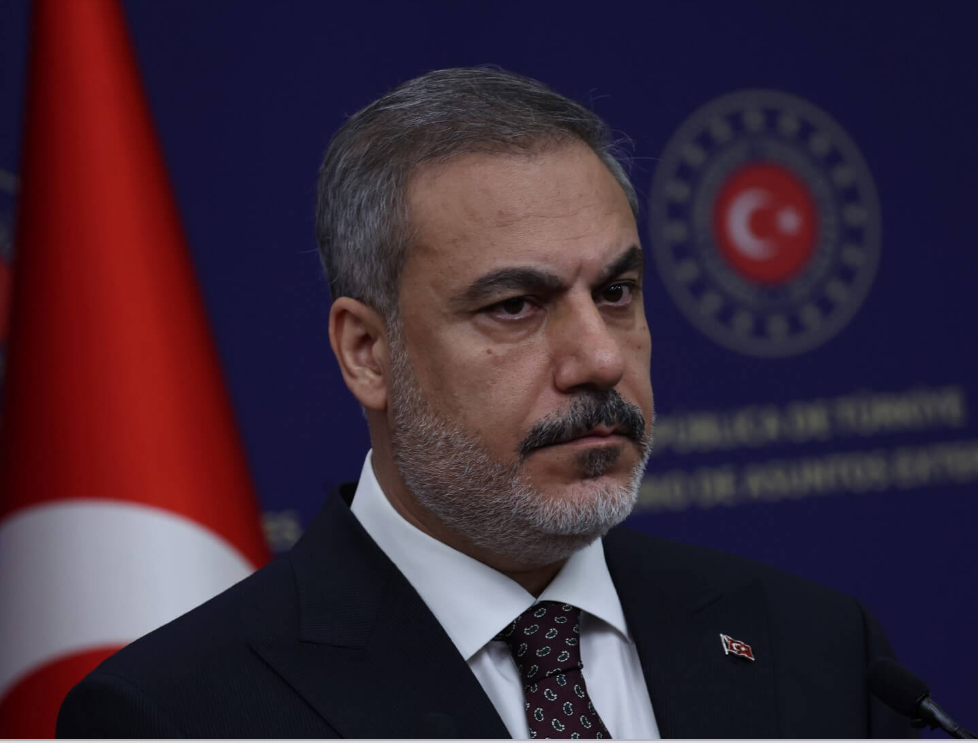Turkish Foreign Minister Hakan Fidan sharply criticized the United States and European countries for their support of Kurdish fighters in Syria, whom Ankara considers an offshoot of the outlawed Kurdistan Workers’ Party (PKK), and for the decisions of the European Court of Human Rights (ECtHR), which he described as “politicized” rulings that “interfere in Turkey’s internal affairs.“
The usually soft-spoken Fidan’s comments come after a ructions visit by his paymaster Erdogan to Germany where he accused the host nation for pandering to Israel because of the collective guilt of the Jewish holocaust. The meeting ended with no progress on two key Turkish demands, namely a date for starting negotiations on a new and expanded Customs Union and 40 Eurofighters, the sale of which were blocked by Germany.
The Turkish parliament’s foreign affairs commission has delayed a vote on Sweden’s NATO membership bid in a further setback to the Nordic country’s hopes of joining the Western alliance after 18 months of waiting.
Chairman Fuat Oktay said the commission, which is controlled by President Tayyip Erdogan’s ruling party, will hold further talks and may bring the bill back on its agenda next week – but he did not set a clear timeline.
“For all of our lawmakers to approve Sweden’s NATO membership, they need to be fully convinced. We will discuss all of these in our (next) commission meeting (on the issue),” Oktay told reporters after hours of debate.
That deadline expires tomorrow, November 22. However, the Turkish press reports that a vote in the Commission is delayed indefinitely.
Fidan’s attack on EU and US is indicative of Erdogan giving up hope on his key demands, namely the approval of $20 bn F-16 order by US Congress and the two aforementioned items from EU.
“Unfortunately, some countries continue to support the PKK-YPG terrorist organization under the pretext of fighting against [the Islamic State]. We keep emphasizing that this is a strategic mistake and that they should absolutely rely on legitimate partners in the fight against [the Islamic State].”
“We have once again strongly emphasized that America’s cooperation with the PKK-YPG, the presence of FETÖ [the Gülen movement] in the US and unilateral sanctions are incompatible with the spirit of the alliance,” Fidan said.
FETÖ is a derogatory term used by the Turkish government to refer to the faith-based movement inspired by US-based cleric Fethullah Gülen as a terrorist organization.
The Turkish government accuses the Gülen movement of masterminding a failed coup on July 15, 2016 and labels it a “terrorist organization,” although the movement strongly denies involvement in the coup attempt or any terrorist activity.
Speaking about Turkey’s messages to the Council of Europe member states, Fidan said, “The message we have conveyed is that Turkey is one of the countries with the highest percentage of implementation of ECtHR judgments among the member states. We have an 89 percent implementation rate.”
“We said these cases are politicized in European capitals even before they come to court and that they have gone from being a legal case to being a part of domestic politics in Turkey. So when you politicize these cases, when you override the law, that’s the answer you get from here. Why do you find that strange?”
Turkey, which has refused to implement the rights court’s rulings in the cases of jailed Kurdish politician Selahattin Demirtaş and prominent businessman and civil society leader Osman Kavala, was also unsettled by a decision from the court’s Grand Chamber last month about a teacher who was convicted of terrorism due to his links to the faith-based Gülen movement.
The court faulted Turkey for the conviction of the teacher, Yüksel Yalçınkaya, on Gülen links due to his alleged use of a mobile application, his bank account and labor union membership. The court concluded that Yalçınkaya’s conviction violated several legal principles enshrined in the European Convention on Human Rights: the right to a fair trial, the principle of no crime without law and the right to association.
President Recep Tayyip Erdoğan and Justice Minister Yılmaz Tunç also spoke out against the ECtHR’s Yalçınkaya decision and accused the court of exceeding its authority.
Turkey, which many say underwent an erosion in the rule of law following a coup attempt in 2016, was ranked 117th among 142 countries in the rule of law index published by the World Justice Project (WJP) in October 2023, adds Turkish Minute.
Erd
ogan is facing a historic test in the guise of end-March 2024 municipal elections, when he and his ally nationalist Bahceli of MHP will confront a divided opposition, which has been somewhat rejuvenated by the leadership in main opposition party, CHP. Polls are rare, but they don’t grant AKP a clear advantage in key hubs like Istanbul, Ankara and Izmir, which Erdogan needs to win back to keep his vast patronage network alive. He has also started a new argument with his loyal partner Bahceli about changing the voting system for presidential elections. Erdogan wants the next president to be elected in a single round winner-takes-it-all contest in place of the current two-round system. On Tuesday Bahceli sharply criticized the proposal.
Fidan’s unexpected outburst about EU and US may signal the start of the election campaign, where Erdogan needs to keep mostly anti-Western MHP voters in his pocket and conjure up new enemies to divert attention from the deepening poverty.
He may succeed in winning municipal elections by tested-and-true methods like these but the cost is alienating the Western Alliance, on which the Turkish economy depends for financing, trade and tourism.
Follow our English language YouTube videos @ REAL TURKEY: https://www.youtube.com/channel/UCKpFJB4GFiNkhmpVZQ_d9Rg
And content at Twitter: @AtillaEng
Facebook: Real Turkey Channel: https://www.facebook.com/realturkeychannel/
